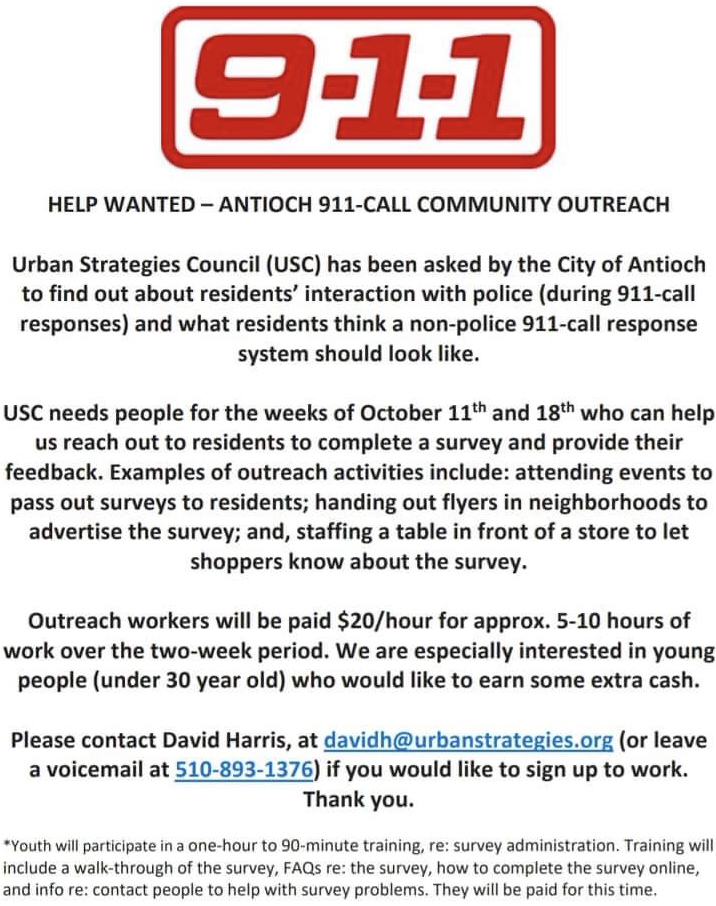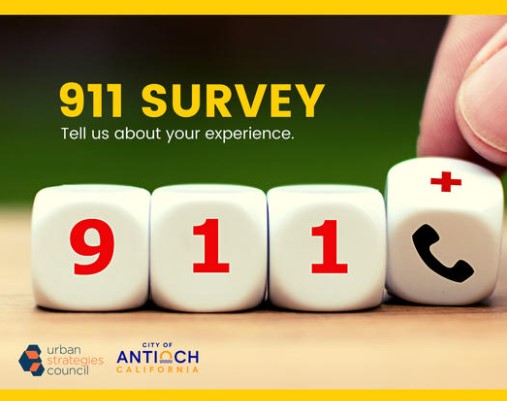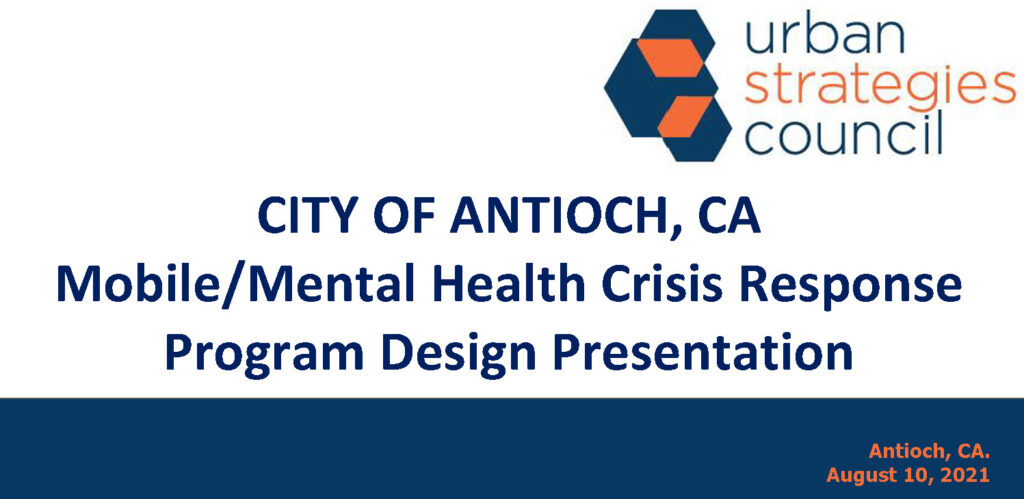Antioch hires social justice organization to develop non-emergency crisis response system, survey residents
Expertise is in data gathering, but no experience developing a program; recruiting workers at $20 per hour for survey; focus is on people of color and impoverished residents
By Allen Payton
During the August 10th Antioch City Council meeting Urban Strategies Council (USC), a-not-for-profit social justice organization, was introduced and hired to design a mobile, mental health crisis intervention model for the City of Antioch, to address non-emergency calls using well-trained community respondents. Urban Strategies Council presentation ACC081021
According to city staff, some calls to 911 and the City’s non-emergency number are for situations that do not need a police officer to respond. To develop Antioch’s program public feedback is needed. USC is collecting input from Antioch residents who have experience with the 911 system or feedback on how the City addresses non-emergency 911 calls and community needs. This survey aims to understand community needs from the voice of the people most impacted.
According to USC’s presentation to the city council, the community resident survey is “focusing on most impacted residents – African-American, Asian-Pacific Islander, Latinx (Latino/Hispanic).” The presentation also shows they plan to have a pilot program developed by the end of this month.
According to Assistant City Manager Rosanna Bayon Moore, “USC is in the process of outreach for the City’s program design phase. A survey is one of the many ways they are collecting information to inform the program design.”
USC has been recruiting workers to help with the survey, offering to pay $20 per hour this past week and next. One was sent to all staff at Antioch High School, according to Jon Davis who works for the school district.

According to their website, USC is “a regional research and advocacy organization dedicated to social, economic, and racial equity. We work to hold institutions and systems accountable to community needs.” Their “mission is to eliminate persistent poverty in the Bay Area by working with partners to transform low-income neighborhoods into vibrant, healthy communities.”
Their work focuses on the issue areas of Criminal Justice Reform, Boys and Men of Color, Economic Opportunity, Pathways to Career and College, and Violence Prevention. Regarding USC’s approach, they write, “In order to move the needle on persistent poverty, we need to change the systems that are currently ineffective, and so we focus on reforming the systems that serve low-income communities.”
Asked why the organization was chosen and what experience they have in developing a non-emergency response system for a city, what does their mission have to do with developing a non-emergency response system, who suggested USC as the organization to hire for this, a staff or council member, and how much the City is paying them to develop the program and do the survey.
Bayon Moore responded Saturday evening with the following: “The City seeks to establish an effective mobile crisis intervention response program. This initiative is supported by the entire City Council. Staff’s work in this area is a high priority which is why the program is being overseen by the City Manager’s Office.
Multicultural literacy is a centerpiece of our approach to program design that cannot be ignored or minimized in terms of importance. This includes but is not limited to being aware and mindful of all resident needs, including our neighbors who may not participate in conventional public processes.
Urban Strategies Council was selected by a multi department interview process that included PD. The engagement threshold is within the City Manager’s signature authority.
I suggest you take a closer look at USC’s professional skills and capabilities. The August presentation I’ve already shared includes a link to materials that describe their prior work and Antioch’s actual scope of work, again, including but not limited to a survey.”
In response, some questions were repeated, and further questions were asked of Bayon Moore late Saturday night, including “how much is the contract for with USC? If they do have any experience developing a non-emergency response program/mobile, mental health crisis intervention model, can you please provide that information or point to where it can be found on their website? What does their mission have to do with developing a non-emergency response system? Why is this focused on people of color and impoverished residents? Is the effort of the survey and entire response program focused on them as is USC’s mission and focus areas? Also, how does USC know, as it shows in the presentation to Council on Aug. 10th, without first surveying Antioch residents, that ‘African-American, Asian-Pacific Islander, Latinx’ are the ‘most impacted residents’ of our city? Do they have some previously gathered data to support that claim? Were any other organizations considered for the project that might have more or any experience developing and implementing one in a city? Finally, without having to take the survey, can you please provide a list of the questions they’re asking?”
Questions were also sent Saturday afternoon to David Harris, President and CEO of USC, asking what experience they have in developing a non-emergency response system for cities and how would a system in Antioch fulfill his organization’s mission. He was also asked, without first surveying Antioch residents, how can he claim, as it shows in his presentation, that “African-American, Asian-Pacific Islander, Latinx” are the “most impacted residents” of our city, and does he have some previously gathered data to support that claim. Finally, Harris was asked if it was one of the city staff or council members who contacted him for the presentation and contract with the city, and if he was still recruiting workers for this next week. He did not respond before publication time, early Monday afternoon.
Harris called late Monday afternoon and agreed to call back later that evening following his organization’s board meeting, or the next day, but did not.

The survey is anonymous and confidential and takes seven minutes to complete.
English/Inglés: https://www.surveymonkey.com/r/Antioch_2021
Spanish/Español: https://www.surveymonkey.com/r/Antioch_Spanish
Please check back later for any updates to this report.
the attachments to this post:

Urban Strategies Council ACC081021 presentation cover

Antioch non-emergency system survey recruitment

911 Non-emergency survey promo

Urban Strategies Council presentation ACC081021





















